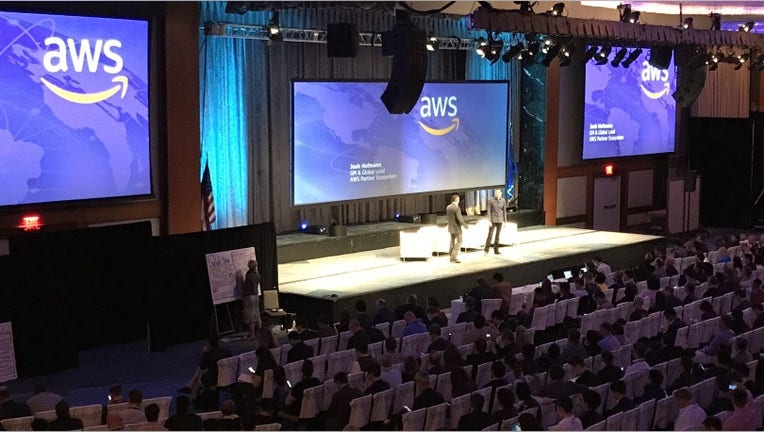
The enterprise blockchain space is turning a corner. At the Consensus conference in New York City, tech and finance giants—including Deloitte, IBM, SAP, and blockchain software company ConsenSys—announced new products, investments, and partnerships as we begin to see more production-ready deployments.
The biggest news of the morning came from ConsenSys, which announced a new software-as-a-service (SaaS) platform called Kaleido, and a partnership with Amazon Web Services to run the platform on AWS and make it available in the AWS Marketplace. Kaleido is a “blockchain business cloud” that turns setting up a permissioned Ethereum blockchain network into a fully cloud-hosted experience.
“For the first time, the enterprise blockchain community can adopt blockchain through a simple SaaS model,” said Kaleido founder Steve Cerveny. “What Salesforce did for CRM. Kaleido is doing for blockchain.”
Kaleido supports popular Ethereum packages Geth and Quorum, and includes features like private network linking with the Ethereum mainnet, integrated analytics, and support for multiple protocol options and consensus mechanisms. Cerveny also detailed a few other tools contained in the experience, including smart contract creation, an explore tool to view and search blocks and transactions, and encrypted storage across AWS zones.
Joshua Hofmann, GM and Global Lead for the AWS Partner Ecosystem, came onstage to announce the partnership. He said ConsenSys is the first pure-play blockchain provider to advance its status within the Amazon partner network.
“Kaleido creates a very easy way for customers to try blockchain…where they don’t have to bring together all the building blocks,” said Hofmann.
Kaleido is available today in the AWS Marketplace.
Deloitte Surveys Enterprise Blockchain Adoption
Deloitte also announced the results of its most recent blockchain survey, which polled 1,053 execs across industries. The survey found at 74 percent of enterprises see a “compelling business case” for blockchain, and 34 percent already have a blockchain system in product. Forty-one percent of respondents expect their businesses to deploy a blockchain app in the next year.
Linda Pawczuk, who heads Deloitte’s US financial services blockchain group, said onstage at Consensus that many of those surveyed also acknowledged the “blockchain fatigue” that has hit the buzzy technology. For others, the sentiment around commercial readiness is only growing stronger.
“Global executives are looking for solutions to move into production this year,” said Pawczuk. “Traditional foundational companies and newly minted companies are moving things toward production.”
The survey also found that nearly 40 percent of enterprises will invest $5 million or more in blockchain tech in the coming year. That said, 22 percent of respondents still lack a compelling application to justify its implementation. The top blockchain use cases were supply chain, Internet of Things projects, digital records, payments applications, and digital currency.
“We’re seeing an evolution in commerce,” said Deloitte’s Rob Masset. “We’re seeing new transaction types, new business models, we’re seeing humans settle transactions differently, and we’re seeing machines settle transactions without humans.”
The financial services giant also announced a few other products and updates. Deloitte is working on a product combining data integrity checks with machine learning techniques to identify malware, as well as a business-to-government communications and regulatory compliance portal. The company also announced EduScrypt, which facilitates real-time validation and sharing of certified qualifications.
The Deloitte survey will be released in early June.
New Partnerships From IBM and SAP
Torsten Zube, SAP’s blockchain head, gave a keynote at Consensus talking about how the tech giant is leveraging the blockchain capabilities in its SAP Leonardo platform for use cases from food supply chains to pharmaceuticals. The company is involved in a number of blockchain pilot projects across industries.
SAP also detailed partnerships with two blockchain startups it’s supporting through SAP Leonardo. Modum combines IoT sensors with blockchain tech on supply chains to ensure data integrity for transactions involving physical products. The other startup is Lition Energy, which matches energy supply and demand on the blockchain using smart contracts.
IBM announced a new partnership as well, partnering with environmental fintech company Veridium on a new digital asset token to revolutionize the carbon credit market. The tokens will be issued on the Stellar financial blockchain network, marking the first time IBM has been involved in a public token issuance.







